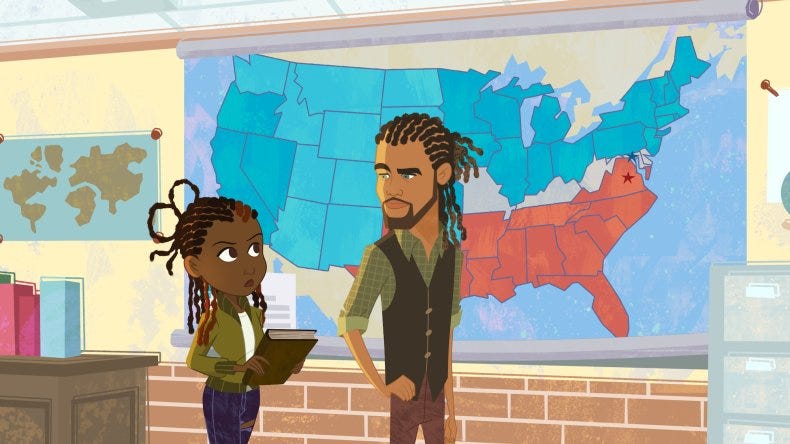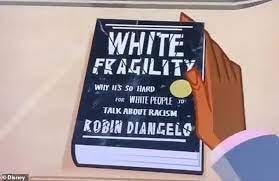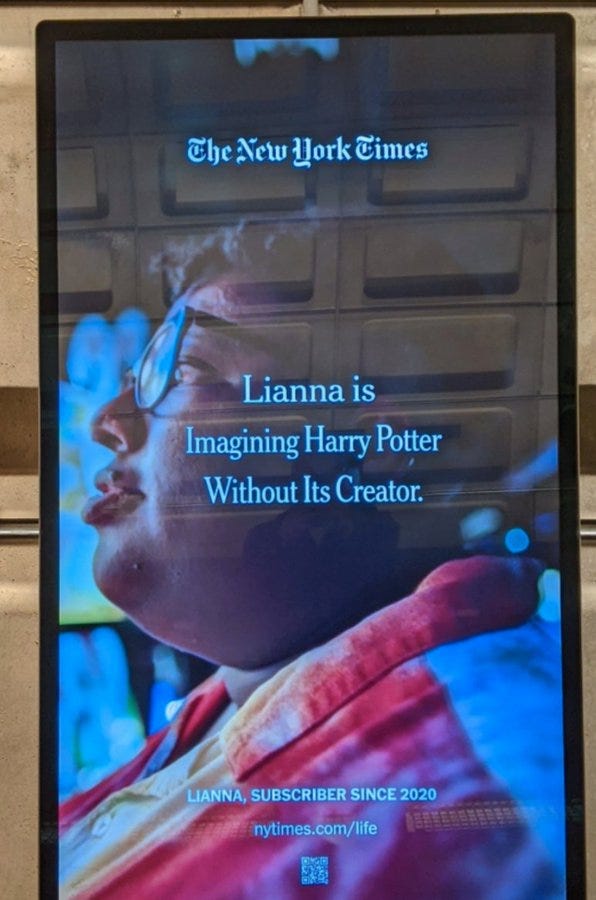What Do We Do When There are No Dragons to Slay?
How J.K. Rowling inadvertently contributed to a frustrated generation
By Jared Feuer
On February 5th, the activist Chris Rufo linked to a clip from the Disney cartoon, The Proud Family: Louder and Prouder, discovered by the Twitter account End Wokeness. The clip is of a song promoting reparations and it has now been viewed 8 million times. Soon selections from another episode of the show were making the rounds, including images of a character reading Robin DiAngelo’s White Fragility.
I admit that I am susceptible to social media controversies because they provide justifiable outrage - what a sweet elixir! And I get a new dose every day? Where do I sign up? Oh, Twitter, right.
But this one stayed with me because I couldn’t shake that one of the characters literally rapped about “The Illuminati” and “The New World Order.” It was a bit much; is this where children’s entertainment has landed? Are we creating a childhood that, in place of imagination, centers political debates? My former neighborhood has a children’s bookstore and each time I stepped into it, I became more concerned. The promotional tables eventually became entirely composed of books about identity and politics. The magic that the preceding generation of children had with Harry Potter, or that my Generation X had with The Neverending Story, or that older generations had with Roald Dahl to C.S. Lewis to the Brothers Grimm - it was vanishing. And perhaps spending time with this new Disney product would help explain what had happened.
So I decided to bite the bullet and familiarize myself with the show.
The Proud Family: Louder and Prouder is a reboot of The Proud Family from the early 2000s. Its two creators are older, established Hollywood types that have worked on Married…With Children, Moesha, Tarzan, and The Princess and the Frog. On the other hand, its Co-Executive Producer Latoya Raveneau is a millennial with politics out in front, declaring her asexual identity publicly and speaking about her “not-at-all-secret gay agenda.”
The protagonists of the show are (with one exception) Black girls who are about fourteen years old, led by Penny Proud of the titular family. She has three primary friends: (1) Dijonay, who lives on social media, (2) Maya, the activist, adopted daughter of two men (one Black and one white Jewish), and the (3) white, tall, and quiet Zoey.
The song in question takes place during a debate competition in the episode “Curved.” The debate coach, Brother Kwame (voiced by Leslie Odom, Jr), is an attractive, calm, smart, political, cool, dreadlocked, vest-wearing representation of Black masculinity. Zoey is the white ally, literally called “Ally Zoey” by Kwame; when she loses her voice (literally and figuratively), a replacement is needed for her on the debate team. In a panic, Penny asks Asian American students and is rebuked, “You can take your model minority myth somewhere else.” Zoey explains to a confused Penny, “I think she just called you a racist,” to which Penny explodes, “Black people can’t be racist!” Maya responds with a definition I have heard in many DEI training sessions: “I agree, racism is prejudice plus power.”
The argument against reparations (Dijonay takes the place of Zoey) is led by a student who tries to cheat before quoting the town’s (Black) preeminent businessman, “So in the words of the great and wise Wizard Kelly, I didn’t earn reparations and I don’t want ‘em.” That is the extent of the counterargument, and it is followed by the protagonists singing their pro-reparations song. It includes these lines:
“We, the descendants of slaves, have earned reparations for their suffering”
“We continue to earn reparations every moment we spend submerged in systemic prejudice, racism, and white supremacy that America was founded with and still has not atoned for”
“We made your families rich”
“Public schools feeding private prisons where we become slaves again”
“Our account is still outstanding”
Throughout the song, the students frown, pump their fists, and look confrontational. When the song concludes, the audience erupts in cheers and it’s clear who won the debate.
The episode “Juneteenth” kicks off with students in jail, fists raised, yelling the protest chant, “What do we want? Justice! When do we want it? Now!” and “Let everybody know that this is what happens when you reveal the truth.” The episode then rewinds to the preceding events.
These events commence when a ‘Karen’ teacher - complete with hairdo - instructs the students to “admire and revere” the town’s founder Christian A. Smith. When Maya shares that she is related to Smith, the teacher replies that this is impossible. But Maya is the adopted daughter of Detective Barry Leibowitz, a distant relative of Smith.
Maya meets the ghost of a young slave girl who leads Maya to her buried diary that reveals the “family farm” on which the town was founded was actually a plantation. Maya searches the Internet but finds that controversial information on Smith is blocked. So she takes the book to Kwame who instructs, “Lincoln really didn’t care about freeing enslaved people. Actually he wanted to deport us.” He explains that the Emancipation Proclamation did not apply to non-seceding states that allowed slaveholding. The students, aghast, note that this is what books about Lincoln should start with.
What Kwame does not explain is that the Emancipation Proclamation was a legal end-run that took advantage of the unique rebellion status of the seceding states. If applied to other states, it arguably wouldn’t have survived legal challenge and that is not considering the military disaster if ‘border’ states subsequently seceded. If Maryland, for example, left the Union, Washington, D.C. would have been surrounded and the war could have been lost.
Kwame is right that Lincoln did consider repatriation, partially out of fear that racial reconciliation was impossible, but he never gave it much effort and stopped evaluating it by the time of the Emancipation Proclamation. Moreover, this idea was also taken up by such Black leaders as Paul Cuffee, and their advocacy would play a role in the founding of Liberia. As usual - it’s complicated. Lincoln did exhibit some of the racism of his time, but he was also a courageous abolitionist who took America to war to prevent the formation of an actual nation based on slavery (paging Nikole Hannah-Jones). For this, he lost his life. He should not be reduced via a duplicitous, cheap shot made by a pretend educator on a children’s show.
When Maya confronts the white Barry about his familial legacy, he refuses to consider it and is hence criticized by his Black husband, Randall, for “white fragility.” At this point, Robin DiAngelo’s book cover spends a significant amount of time on screen as Randall instructs Barry that white fragility is “Being defensive about race. Robin DiAngelo wrote a whole book about it. Read it. You’re on page 39.” (I refuse to buy this book, so I do not know what is on page 39).
The students meet up with Kwame who explains that he reached out to Wizard Kelly but was told, “Get over it, that was 400 years ago” to which the students respond, “Sounds like black fragility.” Determined, they echo John Lewis and declare, “We’ll get into some good trouble. We’ll march until they take that statue down.”
They march to the statue where Wizard Kelly responds, “Officers please put these little kids in cuffs.” At this point storm troopers descend and Maya chants, “Why are you in riot gear? We don’t see no riot here.” The police move on the students and Randall yells at Barry, “Don’t just stand there. Do something with your white privilege.” But Barry is taken with the protestors to jail. Later, despondent and literally sitting on the shitter, he asks the younger generation for absolution: “I guess I was so ashamed of the history that I couldn’t face it…Maya, you and your friends helped me see that and I am eternally grateful.” At this point the group is told they can go but the statue won’t come down. They refuse and the show cuts to commercial. When it returns, it is somehow a month later, the statue has come down, and the town has been renamed for the girl who wrote the diary.
And there we are.
On one hand, the show clearly does a lot of things wrong. It tells false history, satirizes white characters, elevates a singular politics, promotes conspiracy thinking, mocks Black conservatives, and perhaps most importantly, presents easy solutions (renaming a town while 50 million people remain slaves today). But is it worth the outrage? Not over this show, specifically. First, not many people are watching. By the time you drop below the top ten shows on Disney+, you’re under half a million viewers (the specific viewership for The Proud Family is not publicly available). Second, attempts to #boycottdisney are echoing the show’s own shallowness - tilting at windmills and focusing on symbolism. There are complex conversations to have about important topics - The Proud Family is not one of them.
What does concern me, however, is not the impact of the show but what it represents. One generation ago, there was a major cultural touchstone for children: J.K. Rowling’s Harry Potter. The scale of Harry Potter is unprecedented, with half a billion books sold. It is not hyperbole to declare that Rowling played a major role in the formation of millennials - including the people now writing and producing The Proud Family.
Rowling told of kids who were heroic, diverse (but not as diverse as they should have been), loyal, and willing to stand up to groupthink and totalitarianism. Just as importantly, the two main bad guys end up being the bravest of all the characters. Rowling’s characters are not caricatures, but instead multifaceted. Human.
After two decades as the darling of Blue (and much of Red) America, Rowling, a survivor of sexual assault, began articulating a viewpoint in favor of single spaces for cis women in prisons, shelters, locker rooms, and other similar locales. For this she was pilloried to the point that the child actors of her movies will no longer speak with her. As a sign of her expulsion from Blue America, The New York Times ran an advertisement that imagined JK Rowling’s creation without her, a stunning projection by an institution of free expression.
When asked about fans who accused her of “ruining her legacy,” Rowling had the perfect comeback: “[They] could not have misunderstood me more profoundly.” And she’s right. Rowling described the horrors of a world caught by mobs, bullying, and group thought. The activists that attempt to foreclose discussions on the complexities of trans issues, particularly single-sex spaces and medically and surgically transitioning children, should not consider themselves Rowling heroes. They are Dolores Umbridge, shutting down discourse.
But this is where Rowling misses the tragedy that is unfortunately part of her legacy. Inadvertently, of course, but real nonetheless. Rowling played a major role in shaping a generation saturated in stories of standing against injustice; inspiring kids who grew up dressing as heroes who literally fought dragons. But life in the United States is not one of dragons and quests. It’s often boring, complicated, and unrewarding. The last arguable dragon, denying marriage to same-sex couples, was slayed a decade ago. The ones that activists are trying to inflate - trans issues and the environment - are not even close to clear-cut in diagnosis or solution.
There are still dragons outside our borders - for example, as Micah notes, oppressive patriarchies in Afghanistan and Iran. Horrors of war in Ukraine. Violence against LGBT people in Saudi Arabia. Massive worker mistreatment in the United Arab Emirates. Dictators in Cuba and North Korea. Censorship in China. Here at home, there are obstacles to our society being fully just and prosperous, such as gun violence, post-Roe reproductive rights, inequality, and polarization. But these aren’t dragons - they are chronic conditions. They are frustrating, complex, and challenging with no easily discerned bad guy to defeat in one swoop; certainly nothing that can be solved over a commercial break. They are with us for life because they require finding a middle ground, and we never will.
With no domestic dragons and instead the grind of chronic conditions, the Harry Potter Generation is facing a quiet, unheroic life. Mass experiences are real and can create broad shapes for populations, and the many millennials raised to slay dragons are finding that they - like the rest of us - have to get up, go to work or school, spend time with friends and family who might annoy us, compromise constantly, go to sleep, and repeat it all the next day. J.K. Rowling should have prepared her readers for their true fate. When she didn’t, they resorted to creating their own dragons, which ironically now includes her. This tragedy can be seen in the creators of contemporary children’s entertainment like The Proud Family being unable to give to the next generation what J.K. Rowling gifted them: stories of imagination, courage, humanity, and humility that give children the spark they need in an adulthood bereft of dragons.







